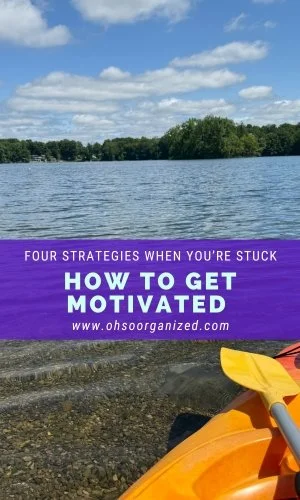Have you ever struggled to get motivated and take action? Many of my virtual organizing clients have encountered periods of low motivation and activation. It’s a common human experience to have lulls.
Reduced motivation can happen for many reasons, including:
Feeling overwhelmed by the enormity of what you want to accomplish.
Being uncertain about what to do next.
Desiring rest rather than active engagement.
Feeling sad or depressed.
Resenting the project you need to work on.
Being unclear about your why.
Wanting to play instead of working on a project.
The Backstory
Sunday is usually the day I write and post my blog. After almost a week of summer vacation fun, I found it hard to get motivated to write. While I planned to write, I struggled to get started.
However, despite feeling unmotivated today, I managed to turn things around. I’ll share the strategies I used to boost my motivation and get going. The next time you’re stuck, I hope one of these ideas helps you.
The irony isn’t lost on me that I was struggling with motivation, and it’s also the topic I’ll be writing about all month.
Four Ways to Get Motivated and Take Action When You Don’t Feel Like It
1. Move the Body
After a week of joyfully kayaking, exploring, and walking, the thought of sitting at my desk for hours to write wasn’t appealing. I wanted to be more physically active.
Instead of writing immediately, my husband and I took a walk along the Hudson River before it got too hot. Well, that was the idea at least. Even though we got outside early, it was already pretty warm. We walked, but shortened our route.
Moving my body first made me feel motivated and less restless about sitting inside to write.
2. Clear the Noise
Especially after being off for a while, some life management things needed my attention. Could they have waited a day or so? Yes. However, the mind clutter they caused made it hard for me to focus on anything else.
It was worth taking the one or two hours to handle those things, so that my thoughts would be clearer to write this post.
Cluttered thoughts or spaces can negatively impact motivation. Doing a simple clearing is significant enough to increase motivation for the task or project you are avoiding.
“Doing a simple clearing is significant enough to increase motivation for the task or project you are avoiding”
3. Set the Stage
When I write, I like to have a hot or cold beverage to sip on. Preparing and keeping it nearby signals that it’s time for me to work. After setting up my drink, I take several additional steps to cue myself to write. These include:
Create a new blank Word document.
Choose the exact topic. These are either from materials in my blog ideas binder or current thoughts that are on my mind.
Write the title.
Add the title to my Blog Plan document.
Once those elements are in place, I’m ready to start writing. No more procrastinating, questioning whether I need to write, or searching for motivation. Just setting up initiates the process.
4. Find the Joy
As I mentioned, part of setting up involves choosing a specific topic I will write about. I reviewed my blog ideas and found something that could work. I wasn’t excited, but I thought it would be a helpful concept to explore.
Then, just before I committed to that plan, I had another idea. What if I shared my experience of lacking motivation instead? I jotted down a few ideas, including the Find the Joy part.
What is the joy part? This is about identifying the element that makes you happy to work on the project you’re doing. The joy factor you include becomes one of the motivating elements.
For me, this meant capturing happy memories of our vacation by making a video, which I included below.
How to Get Motivated?
Motivation isn’t something that is present 100% of the time. Experiencing a dip in motivation is a normal part of life. When you want to take action, yet feel stuck, there are many ways to move forward. What helps you boost your motivation in these situations? Which ideas resonate with you?
I’d love to hear your thoughts. I invite you to join the conversation.
How Can I Help?
Do you need support with organizing, getting motivated, or activating? I’d love to help! Virtual organizing is an extraordinary path forward – Local feel with a global reach.
Let’s talk. You can:
Email me at linda@ohsorganized.com or
Call 914-271-5673
Organizing and sustaining motivation is possible, especially with support.





















